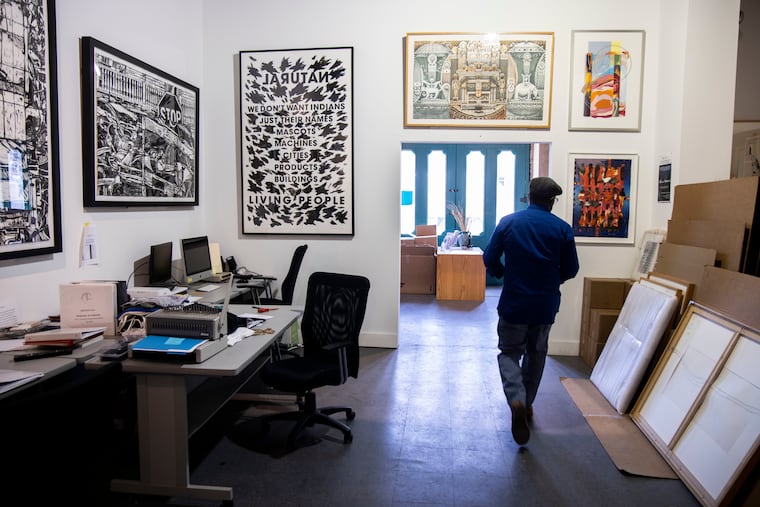Brandywine Workshop seeks to extend its reach online and settle in for its 50th anniversary in 2022
Brandywine is partnering with Drexel on a $500,000 grant to extend and improve a diverse online art database.

As the Brandywine Workshop and Archives looks toward its 50th anniversary next year, founder and driving force Allan Edmunds is seeking to ensure that this unique Philadelphia institution maintains financial and artistic stability.
The workshop has sold off excess real estate and used sale proceeds to pay off all debt. There is no longer any mortgage on its Avenue of the Arts facilities.
Now Edmunds is turning his attention to programming and endowment needs.
On Wednesday, he announced that BWA, as it is known, has received a two-year $500,000 grant from the Andrew Mellon Foundation to continue development of a huge free database of art and artists from diverse backgrounds and ethnicities. The database, Artura.org, includes a digital image library and archive of more than 1,400 prints and works on paper and related educational resources.
What makes Artura.org, which has been up and running for more than a year, so unusual is that Edmunds believes it is the only such database to include a widely diverse group of art and artists.
Beyond Artura, Edmunds turned his attention to an auction Thursday of about 20 artworks, largely prints from his personal collection, to benefit Brandywine at Swann Galleries in New York. Edmunds said the point is “to raise money to build an endowment because we don’t have an endowment.”
The goal, he said, is “to raise five million over five years. I’m hoping that by next fall, we’ll raise at least the first million of that,” Edmunds said. BWA’s 50th anniversary celebration is slated for Oct. 15, a year from now, at the Pennsylvania Academy of Fine Arts, Edmunds said.
“I’m trying to get the ball rolling,” he said. “I’m donating 12 to 14 pieces, somebody else is donating a portfolio. One artist is donating two paintings and another estate is donating two paintings. And we’ll see what happens.”
Thursday’s auction raised about $203,000, Edmunds said, with most works selling above pre-auction estimates.
No decision on additional auctions has been made yet, but there will definitely be more to come with works from various private collections (including more from his own), all designed to build the endowment of BWA.
Edmunds said, “$200,000 was my goal, so I am very happy and this will build momentum for future auctions from art donated by a variety of collectors and diverse artists who support our mission.”
He said he is definitely looking beyond next year and how the workshop will negotiate his departure. He said Harvard University has ponied up some money to help fund a position of deputy director of programs. Part of the Mellon grant will be used for that as well, with the position announced in the next few days, “to let people know that is a new position opening and hopefully, that person can be successful, and perhaps even compete to be my successor when I leave,” said Edmunds.
And what’s the story with that?
“My hope is that I could initially by 50 years, as the founder, I would hope I can leave after 50,” Edmunds said.
The $500,000 grant from the Mellon Foundation will build on Brandywine’s already active partnership with Drexel University, said Rosalind Remer, Drexel’s senior vice provost, university collections and exhibitions; and head of the Lenfest Center for Cultural Partnerships.
“It’s so incredible what he’s done for the development of printmaking and art more generally and communities of color in Philadelphia,” said Remer. “He is quite naturally concerned with the sustainability of that, not only the program but the digital future of it, which he believes is really the core for teaching diverse art.”
Artura.org, Remer pointed out, draws on the hundreds of printmakers that have come through Brandywine over half a century.
“What places like Harvard will do is they’ll look around and say, ‘Oh, we don’t seem to have any diverse art. We need a collection in order to be able to teach,’” she said. “And so they’ll actually buy a satellite collection and their students will curate exhibitions and work with the materials in classes. So Artura is kind of the portal into all of this material.”
At the same time, she said, Edmunds wants to ensure “that Brandywine itself will continue well into the future with printmaking and in-person exhibits. But he’s also hedging his bets and trying to ensure a digital future. And so that’s what we’re really helping with. It’s tremendously exciting. The work is incredible. You know — 50 years of printmaking.”